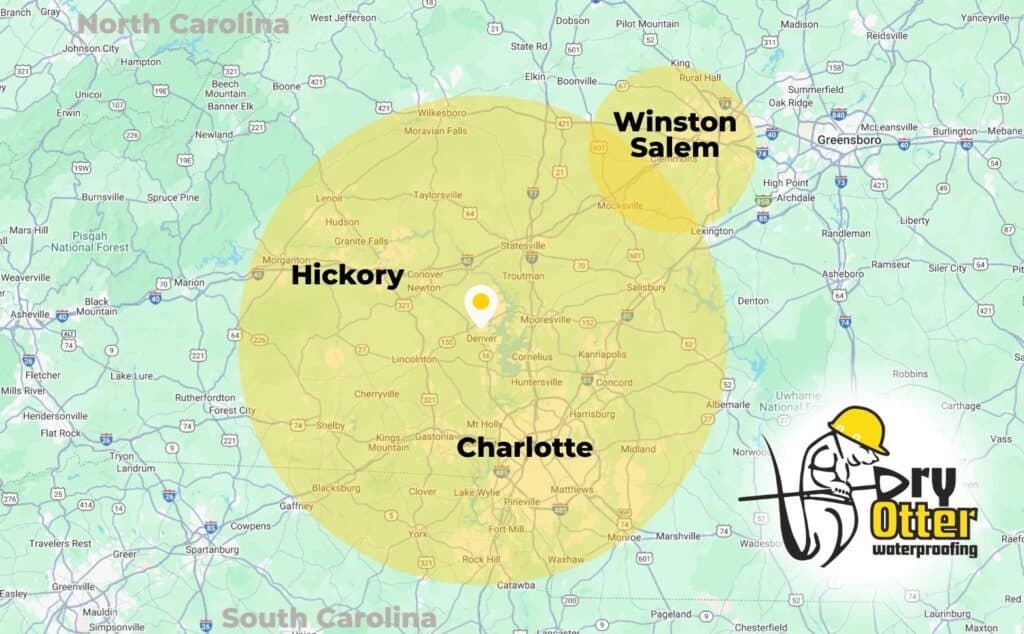
Basement Waterproofing
Basements are notorious for leaking, but they don’t have to. Dry Otter Waterproofing has been locally owned and operated since 2013.
We have excellent Google reviews and maintain an A+ rating with the Better Business Bureau. We have the knowledge and expertise for basement waterproofing so you can use your basement to its full potential.
Why is my basement leaking?
Basements in the Charlotte area have water issues that are caused by multiple factors. When a builder digs up the soil to put in a basement, they must dig out a section larger than the finished product.
Once the basement is complete, they take the loose soil surrounding the foundation and backfill it against the foundation walls to close the gap.
Water will find its way to all this loose soil when it rains. Over time, hydrostatic pressure builds and pushes in on your basement walls. Eventually, water will seep in, usually where the wall and footers meet.
Water can also seep through concrete blocks, leaving behind a white powder residue. This is called Efflorescence.
How do you know if your basement needs waterproofing?
These signs indicate basement waterproofing is required:
- Water on your Basement Floor
- Efflorescence
- Signs of Mold and Mildew
- Musty Smell
- Wet Drywall
- Visible Condensation
- Bowing Walls
- Damp Basement
Why is water in my basement a problem?
Ongoing water damage, including issues like standing water, water leaks, condensation, and more, can often escape notice, particularly if you don’t frequently visit your basement or if there’s a section that doesn’t receive regular attention.
It’s crucial to address prolonged water problems in your basement sooner rather than later, as they can lead to detrimental long-term consequences. In fact, the well-being of both your family and your home hinges on quick action.
Heavy rains in the Charlotte area can aggravate your wet basement issues and make the situation much worse. This could result in additional repair costs in the future. Do not wait and schedule an inspection today to evaluate the damage.
Causes of a Wet Basement
Underground Location
Basements are primarily below ground and tend to be cooler than the rest of the house. Due to this temperature difference, cool air in the basement cannot hold as much moisture as the warmer air in other rooms. When air from upper levels mixes with basement air, it can condense on basement walls, including uninsulated pipes running through it.
Moisture Rising from the Soil
Without proper waterproofing, moisture can gradually rise from the soil below and penetrate the foundation, reaching the basement floor and walls. This is more likely to occur if your home is constructed with porous concrete blocks or bricks.
Broken Pipes and Wall Cracks
Leaky pipes and cracks in the foundation wall serve as pathways for moisture and water infiltration. French drains, rain gutters, and sewer overflows are other potential sources of dampness, often bringing water into contact with basement walls and floors.
Basement Laundry
If you use your basement for laundry and operate a dryer, it can release a significant amount of moisture from the clothes into the basement air. Over time, this moisture can condense, leading to dampness on the walls.
Windows and Window Wells
Basement or egress windows and their associated wells can deteriorate over time, succumbing to external factors like rainfall and hydrostatic pressure. Water from old or damaged windows and clogged window wells can easily seep into the basement, causing leaks and dampness.
How does Dry Otter Waterproof a basement?
Dry Otter installs an engineered floor drain around the interior perimeter of the crawlspace which diverts any water that comes into a sump pump, so that the water can be pumped out of the basement.
A plastic wall liner is also added to direct any water coming in through the block walls to the drainage system and ultimately to the sump pump and out of the basement.
Sometimes, a dehumidifier is installed in the basement, and the water it collects is directed to the sump pump for easy removal.
How long does the waterproofing process take?
There are multiple ways water can infiltrate your home and our initial inspection will help us give you a more specific timeframe. We typically expect our basement waterproofing services to be completed within 3 to 5 days.
How long does basement waterproofing last?
What are the benefits of waterproofing your basement?
Our engineered drain systems work with our wall systems to direct any water that comes in toward the sump pump and out away from the house, giving you peace of mind during storms or when you’re away from home.
If you’re ready to enjoy a fully functional basement space, contact us for a free Dry Otter Basement inspection today!
What Our Customers Are Saying
EXCELLENTTrustindex verifies that the original source of the review is Google. I recently had Dry Otter Waterproofing complete a full crawlspace transformation at my home, and I couldn’t be more impressed with the results. Michael, Will, Josh, and Adam were outstanding from start to finish. Their professionalism, attention to detail, and clear communication made the entire process smooth and stress-free. They installed a sump pump, dehumidifier, full encapsulation, and several other improvements to protect my home from moisture issues. The crew worked efficiently, kept me informed at every step, and treated my property with great respect. The difference in my crawlspace is incredible — clean, dry, and well-protected. If you’re looking for a reliable and knowledgeable team for waterproofing or crawlspace work, I highly recommend Dry Otter. Michael, Will, Josh, and Adam did an exceptional job, and I’m extremely satisfied with the outcome. Thank you to the whole team and God bless you all.Posted onTrustindex verifies that the original source of the review is Google. From Tyler (performing the original basement inspection and developing the plan/estimate), to Carmyn (arranging the appointment and ensuring I had all the info I needed), to Trey & Desmond (keeping me informed on their arrivals/departures, taking care of the encapsulation, getting the work done professionally & in a timely manner, and having Adam make sure I was getting what I needed) this experience was a 10 out of 10 Awesome! They did what they said they were going to do, when they said they would get it done and never made me wonder what was going on. I'm looking forward to seeing what improvements this process will make within my Home. Thank You Trey & Desmond, y'all were Great!💪Posted onTrustindex verifies that the original source of the review is Google. Dry Otter is one of those companies where every step is communicated throughly and leaves no question at any time. The work this company performs is beyond what I expected. The encapsulation service made my crawlspace look like an industrial clean room. We love it!!! Thank you guys for the amazing work!!!Posted onTrustindex verifies that the original source of the review is Google. Great guys 😉 .Posted onTrustindex verifies that the original source of the review is Google. Michael did a wonderful job keeping in communication about what issues I was having with a property. Michael is a wonderful professional. Who knows what he's talking about, and I appreciate the honesty and the effective explanation of what was going onPosted onTrustindex verifies that the original source of the review is Google. Will and Josh just completed my house and my mom’s crawl space . They were on time and very nice . He explained what they were doing and took pictures to show me the complete work . They left everything very clean.Posted onTrustindex verifies that the original source of the review is Google. Will and Josh did an outstanding job. Went out of their way to provide excellent service during the installation and clean up. Very polite and professional. Will did a great job during the final walk through and answered all our questions while providing detailed instructions and advice.Posted onTrustindex verifies that the original source of the review is Google. S/O to Cody, Luis, Tristen, and Bryson for all the hard work they did our crawl. We have a an 1960s ranch style home with a very tight crawl and they got under there and cleaned it up great, treated all our fungus growth, new vapor barrier and dehumidifier install. Very friendly and efficient guys.Posted onTrustindex verifies that the original source of the review is Google. ⭐️⭐️⭐️⭐️⭐️ Highly Recommend Dry Otter! Dry Otter recently completed the full climate control and encapsulation of our crawlspace, and the experience was exceptional from start to finish. Huge shout-out to Tyler, Will, and Josh — an absolutely fabulous team. They were professional, knowledgeable, and incredibly easy to work with. They took the time to educate us without ever trying to oversell anything, gave us clear options, and made the entire process seamless. They showed up exactly when they said they would and truly exceeded our expectations. This is one of those investments that gives long-term protection and peace of mind for your home, and I couldn’t recommend Dry Otter more for anyone considering encapsulation or crawlspace work. Outstanding team and outstanding results!Posted onTrustindex verifies that the original source of the review is Google. I give 5 stars to Will and Josh. They called me in advance to provide an estimated arrival time, arrived on time, and worked hard throughout the day installing the new sump pump system, adding a new dehumidifier, and repairing the barrier. Thank you Dry Otter for employing such great professionals.












Lifetime Warranty
10+ Years Industry Experience
300+ 5 Star Reviews
Schedule Your Free Inspection
Our process includes the following inspections:
Crawl Space Inspection:
- Moisture and Water Damage
- Mold and Fungus
- Insulation Condition
- Vapor Barrier
- Structural Issues
- High Humidity
- Condensation on Ducts
Basement Inspection:
- Water Intrusion
- Cracks and Wall Leaks
- Foundation Integrity
- Sump Pump Operation
- Mold and Mildew
- Basement Floor Cracks
- Hydrostatic Pressure
Our expert will personally visit your home and examine the issues you are having with your basement or crawl space foundation.
Our Service Area


